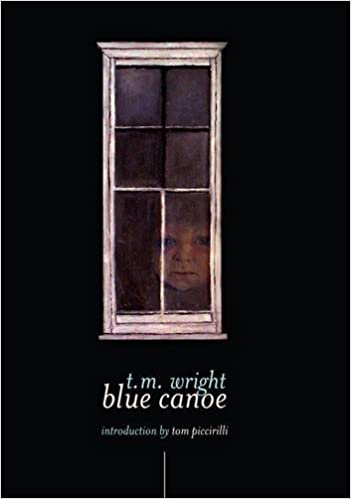 By T.M. WRIGHT (PS Publishing; 2009)
By T.M. WRIGHT (PS Publishing; 2009)
T.M. Wright has written many strange books, including THE ISLAND, THE WAITING ROOM and COLD HOUSE. BLUE CANOE makes those novels look downright conventional, being a rare example of Wright at his most unrestrained—in other words, the genre wraparounds of most of his earlier books are absent here. Yet while there may be no ghosts, zombies or alternate dimensions (at least not of the conventional sort), the novel is very much a horror story, albeit of the most unexpected variety.
Let’s see: there’s an odd man named Happy Farmer. He resides in a large house by a lake, where he’s “locked up in memory” despite the fact that he can’t seem to sort out the details of his life. He’s obsessed with “the town named after the lake,” accessible by a blue canoe whose existence Happy is for some reason deeply insistent about convincing us of.
In the meantime he’s bothered by a constantly ringing phone, the voices of the house’s (apparently) numerous other tenants, a dog he dubs “the-dog-who-would-have-been-Bob-had-he-been-Bob,” and a young woman who periodically brings Happy food on a tray. There’s another woman named Epistobel who may be a). a ghost, b). a delusional phantasm, c). the true identity of the woman who brings Happy his meals, or d). none of the above.
Happy himself is nearly as incorporeal. He doesn’t ask the pivotal question “Why am I here?” until near the book’s end, at which point his already-tenuous hold on reality is becoming dangerously weak. Then again, the precise realit(ies) being depicted are constantly open to question, especially when, shortly past the halfway mark, a new protagonist enters the story: Andrew Grimm, an eccentric, death-obsessed young man attempting to track down Lily Hand, his estranged lover, with the help of an equally eccentric Private Dick named Fred Spoon. Andrew and/or Fred may be Happy in a previous life, or perhaps not, just as Ms. Hand may be a former incarnation of Epistobel…or not. For that matter, the tale overall could be the memoir of an incarcerated madman or a ghost. Both interpretations are equally valid.
If the novel sounds convoluted, inconclusive and scatterbrained that’s because it is. Yet it’s also tight, cunningly structured and streamlined. A contradiction? In most novels yes, but not here. Only in T. M. Wright’s universe could all those adjectives possibly coexist.
As in all his 31-plus books, what Wright is truly after, in his own surreal, poetic fashion, are the emotions behind the scenery: the love, fear and anxiety his characters—and by extension his readers—experience. Sex (one of Happy’s mottoes is “Always protect your orgasm”) is an overriding theme. So is death, and our intimations of what might come after. This makes for a creepy and unsettling piece of work, but also a touching, funny, perplexing and endearing one.
